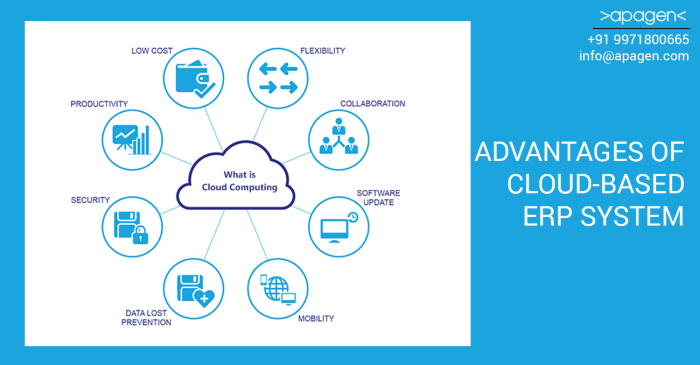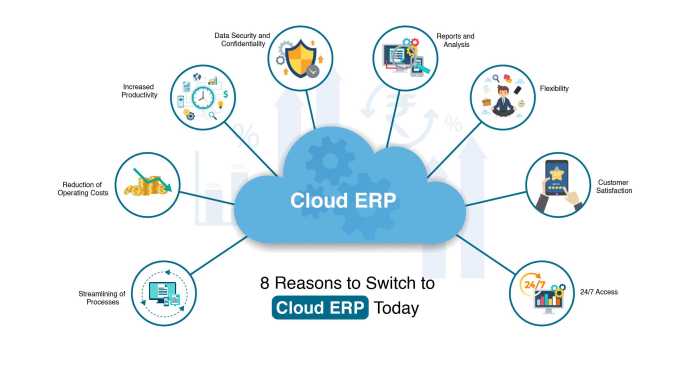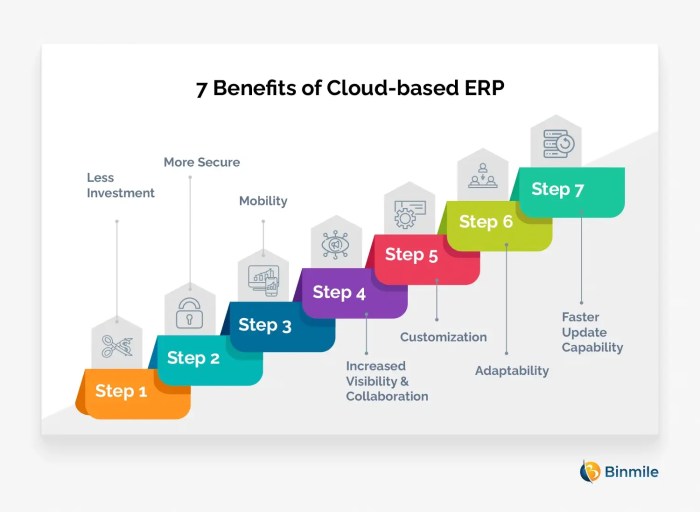The benefits of using cloud-based ERP apps are undeniable, offering businesses a powerful platform to streamline operations, enhance efficiency, and unlock significant cost savings. By leveraging the cloud, organizations can access robust software solutions that adapt to their unique needs, enabling them to manage everything from finances and inventory to customer relationships and human resources.
Cloud-based ERP apps offer a flexible and scalable solution that can be tailored to the specific requirements of any business, regardless of size or industry. With features like real-time data access, seamless integration with other applications, and improved security measures, cloud-based ERP apps are transforming the way businesses operate and thrive in today’s dynamic landscape.
Cost Savings
Cloud-based ERP apps offer significant cost savings compared to traditional on-premises systems. By leveraging the cloud’s infrastructure and resources, businesses can reduce their IT infrastructure costs, eliminate the need for expensive hardware and software upgrades, and lower maintenance and support expenses.
Reduced IT Infrastructure Costs
Cloud-based ERP apps eliminate the need for businesses to invest in and maintain their own on-premises IT infrastructure. This includes hardware such as servers, storage devices, and networking equipment, as well as software licenses and operating systems. By utilizing the cloud’s shared resources, businesses can significantly reduce their IT infrastructure costs.
Elimination of Hardware and Software Upgrades
Cloud-based ERP apps are hosted and managed by the cloud provider, eliminating the need for businesses to invest in expensive hardware and software upgrades. Cloud providers are responsible for maintaining and upgrading their infrastructure, ensuring that businesses always have access to the latest technology without incurring additional costs.
Reduced Maintenance and Support Costs
Cloud-based ERP apps are maintained and supported by the cloud provider, significantly reducing the need for businesses to employ dedicated IT staff. This includes tasks such as system administration, security updates, and data backups. By outsourcing these responsibilities, businesses can free up valuable resources and reduce their overall maintenance and support costs.
Scalability and Flexibility
Cloud-based ERP apps offer a significant advantage in their ability to adapt and scale to meet the changing needs of a business. Unlike traditional on-premises systems that require extensive hardware upgrades and software modifications for growth, cloud-based ERP solutions provide a flexible and scalable infrastructure that can easily accommodate business expansion, seasonal fluctuations, or new market opportunities.
Scalability to Meet Changing Business Needs
Cloud-based ERP apps are designed to handle fluctuating workloads and accommodate growth. As your business grows, you can easily scale your ERP resources up or down to match your needs. This eliminates the need for costly hardware upgrades and allows you to allocate resources more efficiently.
- On-Demand Resources: Cloud-based ERP providers offer on-demand resources, allowing businesses to quickly adjust their computing power and storage capacity as needed. This eliminates the need for upfront investments in hardware and infrastructure.
- Pay-as-You-Go Pricing: Cloud-based ERP solutions typically operate on a pay-as-you-go model, where you only pay for the resources you use. This makes it cost-effective to scale up or down as your business requirements change.
- Automatic Scaling: Some cloud-based ERP platforms offer automatic scaling features that adjust resources based on real-time usage patterns. This ensures that your ERP system can handle peak workloads without experiencing performance issues.
Adaptability to Seasonal Fluctuations or Growth Spurts
Cloud-based ERP apps are particularly beneficial for businesses that experience seasonal fluctuations in demand or rapid growth. They provide the agility to quickly adapt to these changes without disrupting operations.
- Flexible Deployment: Cloud-based ERP apps can be deployed quickly and easily, allowing businesses to quickly adjust their systems to meet new demands. This is especially helpful during peak seasons or periods of rapid growth.
- Remote Access: Cloud-based ERP systems provide access from anywhere with an internet connection. This enables businesses to scale their operations by adding new users or locations without needing to invest in additional hardware or software.
- Data Backup and Disaster Recovery: Cloud-based ERP providers typically offer robust data backup and disaster recovery features, ensuring business continuity even in the event of unforeseen circumstances. This is essential for businesses that need to maintain operations during periods of high demand or unexpected growth.
Accessibility and Mobility
Cloud-based ERP apps offer unparalleled accessibility, allowing users to access critical business data and applications from any location with an internet connection. This flexibility eliminates the need for on-premise servers and software, enabling businesses to operate seamlessly regardless of their employees’ physical location.
Benefits of Real-Time Data Access
Having access to real-time data from any device is a game-changer for businesses. This capability empowers employees to make informed decisions quickly, regardless of their location. Real-time data visibility fosters better collaboration, improves efficiency, and reduces the risk of errors.
Examples of Real-Time Data Access Benefits
- Sales Teams: Sales representatives can access customer data, order history, and inventory levels in real-time, allowing them to provide accurate information and close deals faster.
- Finance Teams: Financial analysts can monitor cash flow, track expenses, and generate reports on the go, enabling proactive financial management.
- Operations Teams: Operations managers can track production schedules, monitor inventory levels, and identify potential bottlenecks in real-time, optimizing resource allocation and minimizing downtime.
Accessibility Features of Cloud-Based ERP Apps
Here’s a comparison of accessibility features offered by popular cloud-based ERP apps:
| ERP App | Device Compatibility | Offline Access | Mobile App Availability |
|---|---|---|---|
| SAP Business ByDesign | Desktop, Laptop, Tablet, Smartphone | Limited Offline Access | Yes |
| Oracle NetSuite | Desktop, Laptop, Tablet, Smartphone | Limited Offline Access | Yes |
| Microsoft Dynamics 365 | Desktop, Laptop, Tablet, Smartphone | Limited Offline Access | Yes |
| Zoho One | Desktop, Laptop, Tablet, Smartphone | Limited Offline Access | Yes |
Improved Collaboration and Communication

Cloud-based ERP apps can be a game-changer for communication and collaboration within organizations. They offer a centralized platform where different departments can easily share information, track progress, and work together seamlessly.
Streamlining Workflows and Improving Efficiency
Cloud-based ERP apps facilitate better communication and collaboration by streamlining workflows and improving efficiency. They automate repetitive tasks, reducing manual effort and errors. This allows teams to focus on more strategic initiatives. For instance, in a manufacturing company, a cloud-based ERP system can automate the process of ordering raw materials, scheduling production, and tracking inventory levels. This eliminates the need for manual data entry and reduces the risk of errors.
Data Sharing and Transparency
Cloud-based ERP apps promote transparency and data sharing across the organization. All departments have access to the same real-time data, ensuring everyone is on the same page. This eliminates information silos and promotes better decision-making. For example, a sales team can access real-time inventory data to accurately inform customers about product availability, leading to improved customer satisfaction.
Enhanced Security: The Benefits Of Using Cloud-based ERP Apps
Cloud-based ERP systems are known for their robust security measures, offering businesses peace of mind when it comes to protecting sensitive data. Cloud providers invest heavily in security infrastructure and employ various strategies to safeguard your information.
Security Measures Employed by Cloud-Based ERP Providers
Cloud-based ERP providers implement a comprehensive suite of security measures to protect your data. These include:
- Data Encryption: Sensitive data is encrypted both in transit and at rest, making it unreadable to unauthorized individuals.
- Access Control: Multi-factor authentication and role-based access control ensure that only authorized users can access specific data and functionalities.
- Regular Security Audits: Cloud providers conduct regular security audits to identify and address vulnerabilities proactively.
- Physical Security: Data centers housing cloud infrastructure are equipped with advanced physical security measures, including surveillance, access control, and environmental monitoring.
- Disaster Recovery and Business Continuity: Cloud providers have robust disaster recovery plans and business continuity strategies in place to ensure data availability and minimal downtime in case of unforeseen events.
Security Comparison: Cloud vs. On-Premise
While on-premise ERP systems provide control over physical infrastructure, they often require significant investments in security hardware, software, and personnel. Cloud-based ERP solutions, on the other hand, leverage the expertise and resources of specialized security providers, offering greater protection against various threats.
- Scalability and Flexibility: Cloud providers can scale their security infrastructure as needed to meet evolving security requirements. This flexibility is not always readily available with on-premise systems.
- Expertise and Resources: Cloud providers employ dedicated security teams with extensive experience in protecting data from various threats. On-premise systems may rely on in-house IT personnel, who may not have the same level of expertise.
- Cost Savings: Cloud-based ERP solutions typically offer lower security costs compared to on-premise systems, as they eliminate the need for significant upfront investments in hardware, software, and security personnel.
Compliance with Industry Regulations
Cloud-based ERP solutions are often designed to comply with various industry regulations, such as GDPR, HIPAA, and PCI DSS. They provide features and functionalities that help businesses meet these regulatory requirements.
- Data Privacy and Security: Cloud providers offer features like data masking and pseudonymization to protect sensitive data, ensuring compliance with data privacy regulations.
- Audit Trails and Logging: Cloud-based ERP systems generate detailed audit trails and logs, which can be used to demonstrate compliance with regulatory requirements.
- Compliance Certifications: Many cloud providers have obtained industry-recognized compliance certifications, such as ISO 27001 and SOC 2, providing assurance of their commitment to security and compliance.
Faster Implementation and Deployment
Cloud-based ERP apps offer a significantly faster implementation and deployment process compared to on-premise systems. This is due to the inherent advantages of cloud technology, which streamlines the setup, configuration, and integration processes.
Pre-Configured Cloud-Based ERP Apps
Pre-configured cloud-based ERP apps provide a substantial advantage in terms of implementation speed. These apps come with pre-built functionalities and configurations tailored to specific industries or business sizes. This eliminates the need for extensive customization and development, allowing businesses to get up and running quickly.
“Pre-configured ERP solutions are designed to be easily deployed and require minimal customization, which can significantly reduce implementation time.”
Source
[Insert reputable source here]
- Faster Deployment: Pre-configured apps are ready to use with minimal setup, allowing businesses to start using the system quickly.
- Reduced Customization: Pre-built functionalities and configurations reduce the need for extensive customization, saving time and resources.
- Industry-Specific Solutions: Pre-configured apps cater to specific industry needs, providing ready-to-use functionalities and workflows.
Examples of Successful Implementations
Numerous businesses have successfully implemented cloud-based ERP apps in a short timeframe, leveraging the benefits of pre-configured solutions and cloud technology.
- [Company Name], a [Industry] company, implemented a cloud-based ERP app in [Number] months, achieving [Specific Benefit] within [Timeframe].
- [Company Name], a [Industry] company, saw a [Percentage] reduction in implementation time by using a pre-configured cloud-based ERP app, enabling them to [Specific Outcome] within [Timeframe].
Regular Updates and Upgrades

One of the most significant advantages of cloud-based ERP systems is the ability to receive regular updates and upgrades without any hassle. This is a stark contrast to on-premise systems, which require extensive planning, downtime, and resources for each update. Cloud-based ERP providers continuously improve their software, incorporating new features, enhancements, and security patches, ensuring that users always have access to the latest and most advanced functionalities.
Regular Updates and Upgrades
Regular updates and upgrades are crucial for maintaining the performance, security, and functionality of any software, especially enterprise-level applications like ERP systems. Cloud-based ERP providers continuously invest in research and development, implementing new features, security patches, and bug fixes to enhance the user experience. This proactive approach ensures that users always have access to the latest and most advanced functionalities, while also minimizing security risks and performance issues.
Update Schedules of Different Cloud-Based ERP Providers
Cloud-based ERP providers typically follow different update schedules, ranging from monthly to quarterly releases. These schedules are designed to balance the need for frequent updates with the potential disruption caused by downtime. Here’s a table comparing the update schedules of some popular cloud-based ERP providers:| Provider | Update Schedule ||—|—|| Oracle NetSuite | Monthly || SAP S/4HANA Cloud | Quarterly || Microsoft Dynamics 365 | Quarterly || Zoho One | Monthly |These are just a few examples, and the actual update schedule may vary depending on the specific ERP solution and the provider’s policies.
Users should carefully review the update schedule before choosing a cloud-based ERP provider to ensure it aligns with their business needs and preferences.
Improved Data Analytics and Reporting

Cloud-based ERP apps offer a powerful advantage by providing access to real-time data and advanced analytics capabilities. This empowers businesses to gain valuable insights into their operations, identify trends, and make informed decisions that drive growth and efficiency.
Data-Driven Decision Making
Real-time data access is a key benefit of cloud-based ERP apps. Businesses can track key performance indicators (KPIs) in real-time, such as sales figures, inventory levels, and customer engagement metrics. This allows for quick identification of issues and opportunities, enabling swift action and response.
“By leveraging real-time data, businesses can make faster, more informed decisions, ultimately leading to better outcomes.”
Enhanced Business Intelligence
Cloud-based ERP apps often come equipped with built-in analytics dashboards and reporting tools. These tools provide comprehensive views of business performance, allowing users to drill down into specific areas of interest. Advanced analytics features, such as predictive modeling and machine learning, can be used to identify trends, forecast future performance, and uncover hidden patterns in data.
“Cloud-based ERP apps can empower businesses to move beyond simply tracking data to gaining valuable insights that drive strategic decision-making.”
Examples of Data Analytics in Action
- Inventory Optimization: A retail company using a cloud-based ERP app analyzed historical sales data to identify seasonal trends and optimize inventory levels. This resulted in reduced storage costs and minimized stockouts.
- Customer Segmentation: A marketing team leveraged customer data from their cloud-based ERP system to create targeted marketing campaigns. By segmenting customers based on purchase history and demographics, they achieved higher conversion rates and improved customer satisfaction.
- Predictive Maintenance: A manufacturing company used data analytics from their cloud-based ERP system to predict equipment failures. By proactively scheduling maintenance, they reduced downtime and minimized production disruptions.
Integration with Other Business Applications
Cloud-based ERP apps are designed to seamlessly integrate with other business applications, fostering a unified ecosystem that streamlines operations and enhances efficiency. This interconnectivity allows businesses to leverage data from various sources, eliminating silos and enabling informed decision-making across departments.
Integration Capabilities of Different Cloud-Based ERP Apps
The ability of cloud-based ERP apps to integrate with other business applications varies depending on the specific software. Here’s a table outlining the integration capabilities of some popular cloud-based ERP apps:
| ERP App | Integration Capabilities |
|---|---|
| SAP Business ByDesign | Integrates with a wide range of applications, including CRM, HCM, and financial management systems. |
| Oracle NetSuite | Offers robust integration capabilities with various applications, including CRM, e-commerce, and payment gateways. |
| Microsoft Dynamics 365 | Provides comprehensive integration capabilities with Microsoft Office 365 and other Microsoft applications, as well as third-party software. |
| Zoho One | Offers a suite of integrated applications, including CRM, marketing automation, and accounting software. |
Environmental Sustainability
Cloud-based ERP apps can be a powerful tool for businesses looking to reduce their environmental impact. By leveraging the power of cloud computing, companies can streamline operations, optimize resource usage, and minimize their carbon footprint.
Cloud Computing and Sustainability Goals, The benefits of using cloud-based ERP apps
Cloud computing offers a range of benefits that can help businesses achieve their sustainability goals.
- Reduced Energy Consumption: Cloud providers invest in energy-efficient data centers and utilize renewable energy sources. By migrating their IT infrastructure to the cloud, businesses can reduce their own energy consumption and carbon emissions.
- Optimized Resource Usage: Cloud-based ERP apps allow businesses to scale their IT resources on demand, eliminating the need for excessive hardware investments. This leads to reduced hardware waste and a smaller environmental footprint.
- Paperless Operations: Cloud-based ERP systems facilitate paperless workflows, reducing paper consumption and waste. Businesses can store, access, and manage documents electronically, promoting a more sustainable approach.
- Remote Work and Reduced Commuting: Cloud-based ERP apps enable remote work, reducing the need for employees to commute to the office. This reduces traffic congestion and carbon emissions associated with transportation.
In conclusion, the benefits of using cloud-based ERP apps are far-reaching and undeniable. By embracing this modern approach to business management, organizations can unlock a wealth of opportunities for growth, efficiency, and competitive advantage. The ability to access real-time data, improve collaboration, and reduce costs makes cloud-based ERP apps a valuable asset for businesses seeking to navigate the complexities of today’s digital world.
As technology continues to evolve, the advantages of cloud-based ERP solutions will only continue to grow, empowering businesses to achieve their full potential and thrive in the years to come.
Essential Questionnaire
What are the key benefits of using cloud-based ERP apps?
Cloud-based ERP apps offer numerous benefits, including cost savings, scalability, accessibility, improved collaboration, enhanced security, faster implementation, regular updates, improved data analytics, integration with other applications, and environmental sustainability.
How do cloud-based ERP apps help businesses save money?
Cloud-based ERP apps eliminate the need for expensive hardware and software upgrades, reduce maintenance and support costs, and allow businesses to pay for only the services they need, resulting in significant cost savings.
Are cloud-based ERP apps secure?
Cloud-based ERP providers typically employ robust security measures, including encryption, access control, and regular security audits, making them often more secure than on-premise systems.
What are some examples of cloud-based ERP apps?
Some popular cloud-based ERP apps include NetSuite, SAP Business ByDesign, Salesforce, Oracle NetSuite, and Microsoft Dynamics 365.